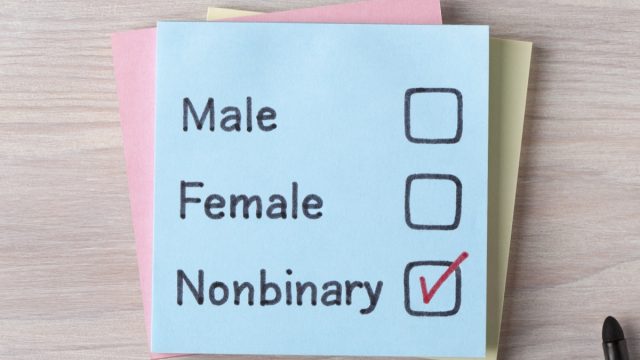People Refuse to Acknowledge My Pronouns. Here’s What That’s Like.

For those who aren’t trans and for those who feel comfortable with male or female pronouns, “he,” “she,” and “they” are just words. They’re single syllables that barely get a second thought. But when you’re trans or nonbinary, being referred to as “she” when you prefer “they” or being referred to as “he” when you’re transitioning is about much more than simple semantics.
Preferred pronouns are as intimate as names. We tend to respect people who prefer their middle names or a nickname instead of the name that appears on their birth certificate. But when it comes to the pronouns someone asks to be called, that same courtesy often isn’t afforded.
In late January 2017, Poynter published an article about my local journalism newsletter. Of course, it was a professional win, but for me, the feature wasn’t only about my latest passion project; it was also a subtle but firm public announcement of my pronouns. I wanted this one clause—”Stevens, who is non-binary and uses the singular ‘they’ pronoun”—to make a world of difference. It was my way of telling the world I no longer wanted to be referred to by the pronouns “she,” “her,” and “hers,” but instead by the gender-neutral pronouns “they,” “them,” and “theirs.”
I returned to work after the article was published with a spring in my step. As I combed through my emails, however, an invitation to a group outing quickly extinguished my newly earned confidence: “Ladies,” the email began. The greeting was familiar, friendly, and meant in good faith. And yet, for me, it came off as a kind of personal rejection. It showed that the colleague who had sent it was still ignoring my increasingly exhausted requests to stop referring to me in feminine ways. And it meant the Poynter article was not the magic fairy dust I’d hoped it would be.
Gendered terms tell us a lot about each other. They tell others how we view ourselves, and how we wish to be viewed. In English, pronouns most often announce someone’s gender, a nebulous concept that some attempt to simplify by conflating it with the still-complicated subject of biological sex. So when trans people ask friends, colleagues, and loved ones to use a new set of pronouns, the knee-jerk reaction is often confusion or dismissiveness. In the case of non-binary people who use singular “they” or who prefer gender-neutral terms of address (like “ze” or “ve”), the response is usually downright refusal.
That refusal isn’t always overt, either. Actually, my conversations about pronouns with the colleague who had sent that invitation had always been polite and respectful. She would assure me that she understood, and would try. But those reassurances didn’t carry forward into action. In fact, most of the few colleagues I told about my non-binary identity acknowledged and accepted the information before going back to what they were doing before.
Since no one seemed to listen, eventually I dropped it. I stopped correcting them and I stopped politely asking them to use my pronouns. But I didn’t forget what their tacit refusal implied: a lack of consideration on their part, and a lack of societal power on mine.

The decision to forget—or ignore—that gender is more complicated than male and female tends to be concealed in debates about proper grammar. A large number of publications regard the singular “they” as too confusing, too in conflict with the rules of English. And yet, in casual conversations, people seem to have no qualms with singular “they.” When referring to someone whose gender and name isn’t known, for example, few people are likely to utter the phrase “he or she.” In fact, singular “they” is older than the singular “you”—older even than Shakespeare and Chaucer, both of whom used it in their works.
So when someone refuses to use singular “they” in reference to me, or complains that it’s too hard, I know that the complaint is not about grammar, but about my non-binary identity. Using singular “they” would affirm, to that person, a reality beyond comprehension. It’s an admittance that my pronouns compete with, and in fact disrupt, whatever assumptions the person has made about my identity—that I’m a woman, for example, or that I’m comfortable in the social roles assigned to that gender identity.
Ultimately, calling me “she” after I ask for “they” is a sign of disrespect; it’s an assertion that my understanding of myself is less important than another person’s first impressions. And it’s an exhausting experience, especially when repeated en masse. Whether it’s the Associated Press misgendering non-binary musician Sam Smith or Elle’s use of feminine pronouns for FX Pose star Indya Moore, non-binary and trans people are subjected to repeated reminders that the supposed concrete rules of English trump basic courtesy. Simplicity, it seems, is more important than accuracy.
The disrespect that comes with being misgendered has an especially lingering effect in vulnerable situations, around people who are otherwise trusted to be empathetic and kind. During my second session with a new therapist, for example, I mentioned that I was no longer comfortable with others referring to me, or perceiving me, as a woman. After explaining that I was non-binary, I told her that I had been struggling with the isolation and depression that came with being constantly told that my own self-conception was wrong.
“You just need to loosen up, girl,” the therapist replied cheerfully, grinning as if the quip was funny, instead of belittling. “I’m going to call you girl.”
That response, however intended, insured that I never booked a follow-up session. The disrespect it carried outweighed any future help that therapist could have provided.

Yes, gendering someone correctly or incorrectly can also be the difference between earning someone’s business and losing it. As a freelance writer, I’ve worked with clients who will gender me correctly in direct emails, but whose forwarded correspondences show a tendency to forget that small courtesy when I’m not immediately part of the conversation. Those interactions tell me which editors to trust, and which to remain guarded with.
Likewise, I frequently wear a pin listing my pronouns while traveling around in public. Coffee shops and restaurants where I’m gendered correctly earn my return business; when I’m called “ma’am,” on the other hand, it makes me dread walking in the door.
Recognizing trans and non-binary people’s pronouns may not seem important, especially for those who’ve never experienced the frustration and ostracization that come with being constantly misgendered. But if other people’s feelings matter to you, then using preferred pronouns—while an adjustment—shouldn’t be an ordeal. The cost of using “they” when you’d rather use “she” or “he” is absolutely nothing. The cost of not doing so, however, can be far greater. And for more ways to stop accidentally offending people, read up on the 11 Stereotypes People Should Stop Believing About the LGBTQ Community.
To discover more amazing secrets about living your best life, click here to follow us on Instagram!